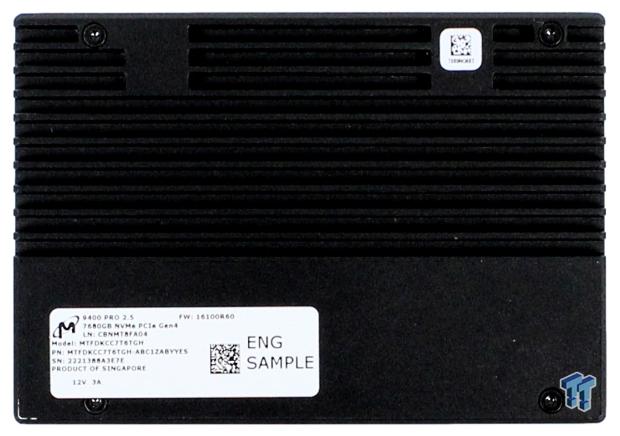
The Bottom Line
Pros
- + Random read
- + Efficiency
- + Capacity
Cons
- - None
Should you buy it?
AvoidConsiderShortlistBuyIntroduction and Drive Details
Today Micron is unveiling the highest-performing PCIe Gen4 SSD we've ever come across. Micron's 9400 series of enterprise SSDs are designed to manage the most demanding data center workloads, including artificial intelligence, machine learning, and high-performance computing applications. The 9400 series, like its immediate predecessor, the 7450 series, comes arrayed with Micron's highly prolific 176-Layer B47R 3-bit flash.
This stuff is super-fast, as we saw with the 7450 Pro, which we reviewed back in November. Micron's B47R via the 7450 Pro delivered the best performance we've ever obtained from a flash-based SSD.
Even though it's arrayed with the same B47R flash, the 9400 Pro is a very different animal from the mainstream 7450 Pro. The 9400 series is much more powerful, capable of delivering an unprecedented 1.6 million IOPS over PCIe Gen4 and sequential write throughput of up to 7,000 MB/s. In addition to delivering up to 60% more IOPS than the 7450 series, the 9400 series doubles the footprint efficiency, with capacity points of up to 30.72 TB.
By doubling capacity per SSD, Micron is enabling enterprises to store the same amount of data in half as many servers. As we see it, the 9400 series is the most efficient data center SSD in existence.
Unlike the 7450 series, which is available in multiple form factors, the 9400 series is U.2/U.3 only and only 15mm at that. This makes sense as 15mm U.3 offers the highest capacity potential as well as performance potential. This is the most efficient configuration in terms of TCO per IOP generated. The 9400 series enables a wide range of data center workloads and does so with the right blend of performance, capacity, and endurance.
Micron's 9400 Pro Series is being launched alongside a write-intensive version designated as the 9400 MAX. The more heavily overprovisioned MAX version is rated for three drive writes per day, whereas the Pro is rated for one drive write per day. Read performance for both versions is identical, but steady-state write performance for the MAX version is double that of the Pro, offering up to 600,000 IOPS.
Specs/Comparison Products
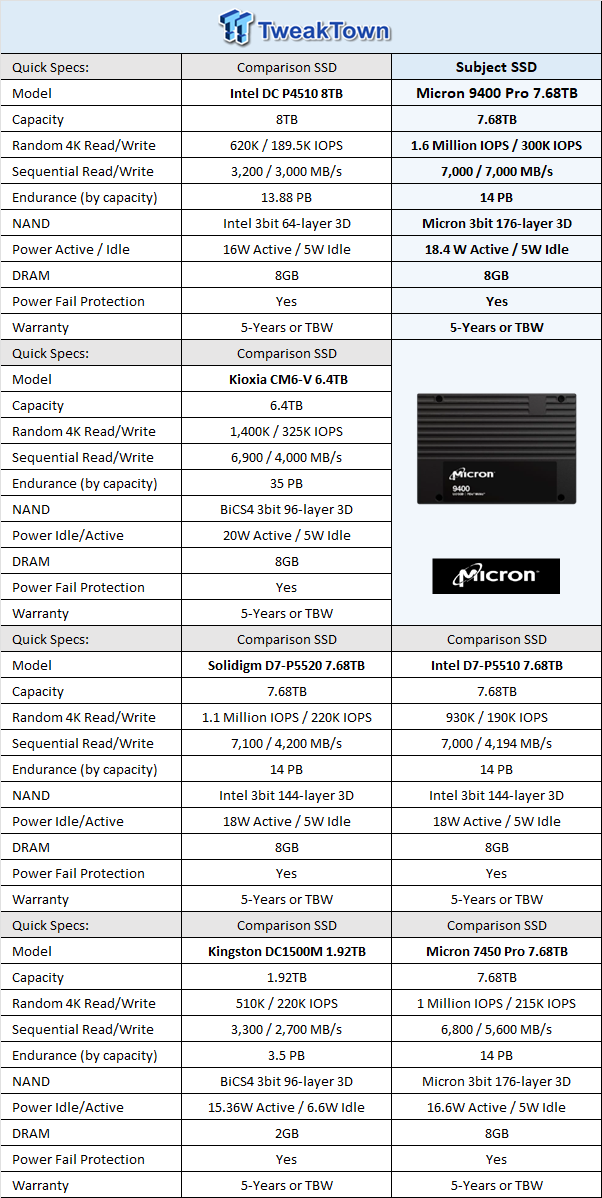
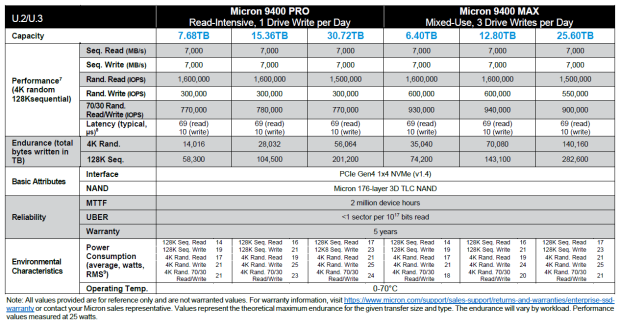
Micron 9400 Pro 7.68 TB NVMe PCIe Gen4 x4 U.3 SSD
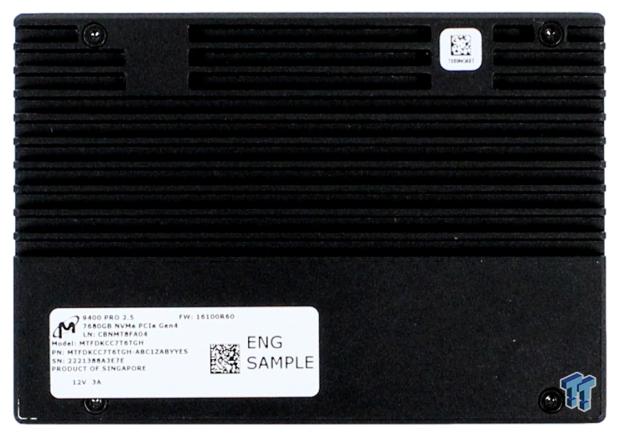
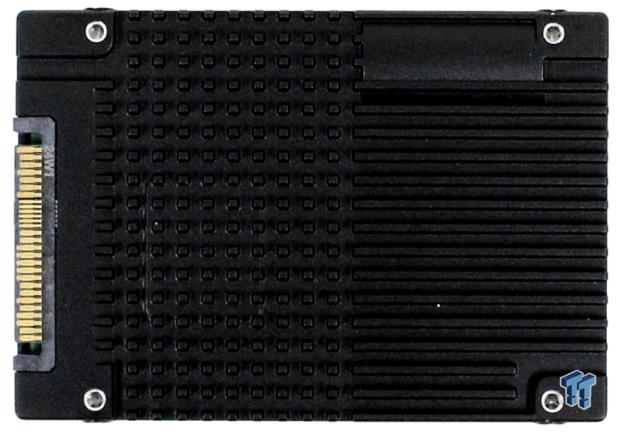
The top of the drive's aluminum alloy enclosure is typical for a 9000 series SSD. The underside is a deeply finned cast aluminum piece that serves as a heatsink.
Enterprise Testing Methodology
TweakTown strictly adheres to industry-accepted Enterprise Solid State Storage testing procedures. Each test we perform repeats the same sequence of the following four steps:
- Secure Erase SSD
- Write the entire capacity of SSD a minimum of 2x with 128KB sequential write data, seamlessly transition to the next step
- Precondition SSD at maximum QD measured (QD32 for SATA, QD256 for PCIe) with the test-specific workload for a sufficient amount of time to reach a constant steady-state, seamlessly transition to the next step
- Run test-specific workload for 5-minutes at each measured Queue Depth, and record results

Benchmarks - Random and Sequential Performance
4K Random Write/Read
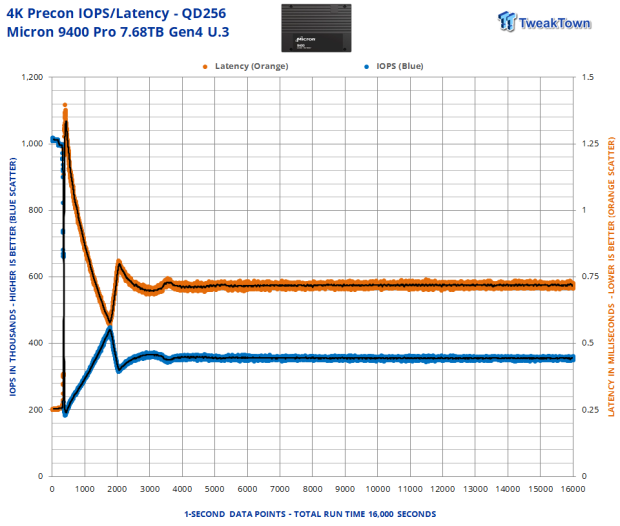
We precondition the drive for 16,000 seconds, receiving performance data every second. We plot this data to observe the test subject's descent into steady-state.
Steady-state is achieved at 4,000 seconds of preconditioning. The average steady-state write performance at QD256 is approximately 350K IOPS. The extremely tight pattern with virtually no outliers indicates high QoS.
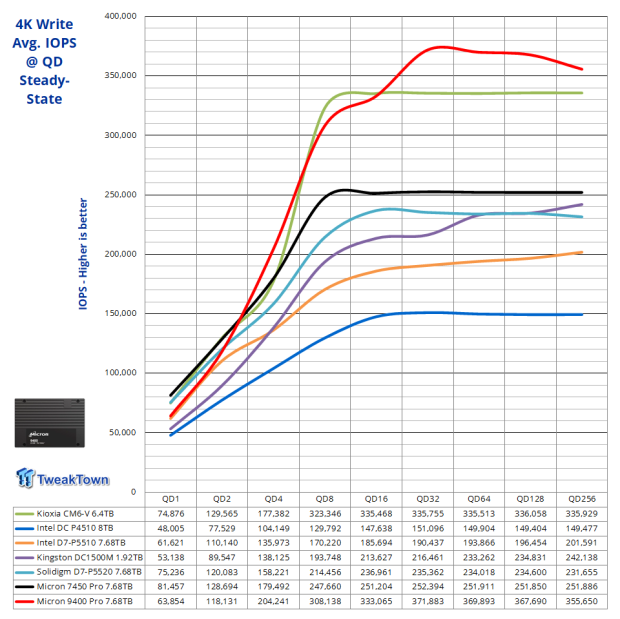
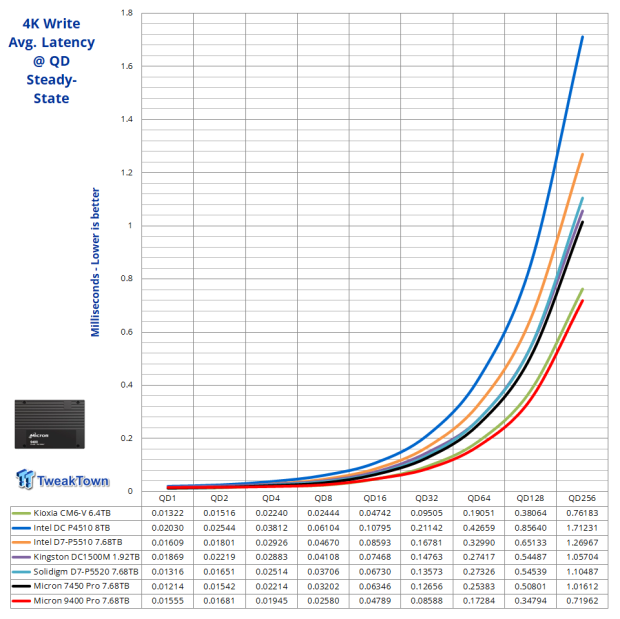
We are hitting a max of 371,000 4K random write IOPS which is 71K better than the stated sustained 4K random write spec. By far the best random write potential we've seen from any similarly overprovisioned flash-based SSD we've tested to date. Impressive.
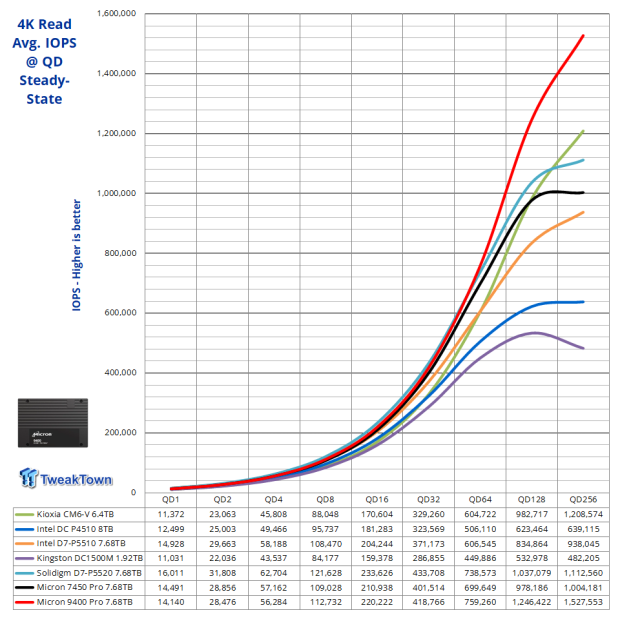
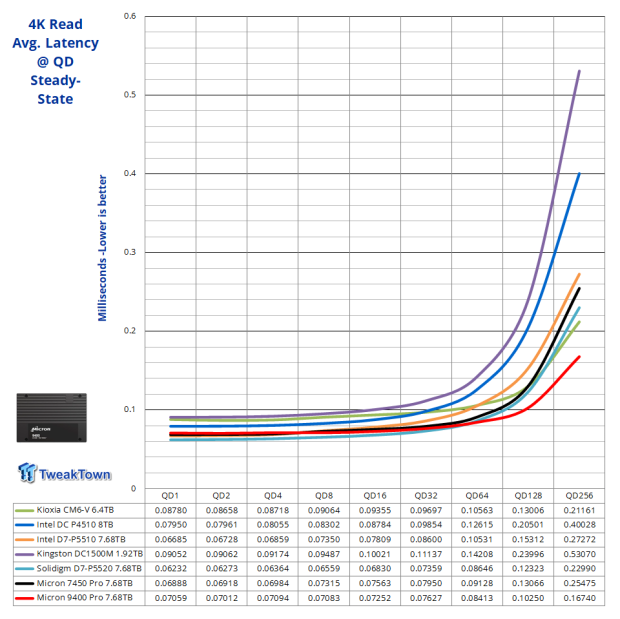
Random read performance is where performance matters most, most of the time, for the majority of use-case scenarios. Micron specs its 7.68TB 9400 Pro as capable of delivering up to 1.6 million IOPS here.
We get close at 1.53 million IOPS, which is by far the best we've ever obtained from a flash-based PCIe Gen4 SSD. We speculate that our Datacenter 2022 OS being slightly less efficient than Linux is the reason we fall just short.
8K Random Write/Read
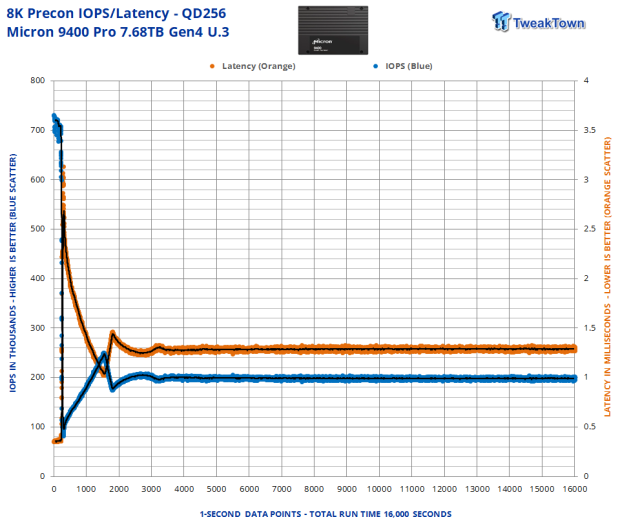
We precondition the drive for 16,000 seconds, receiving performance data every second. We plot this data to observe the test subject's descent into steady-state.
Steady-state is achieved at 4,000 seconds of preconditioning. The average steady-state write performance at QD256 is approximately 200K IOPS. The extremely tight pattern with virtually no outliers indicates high QoS.
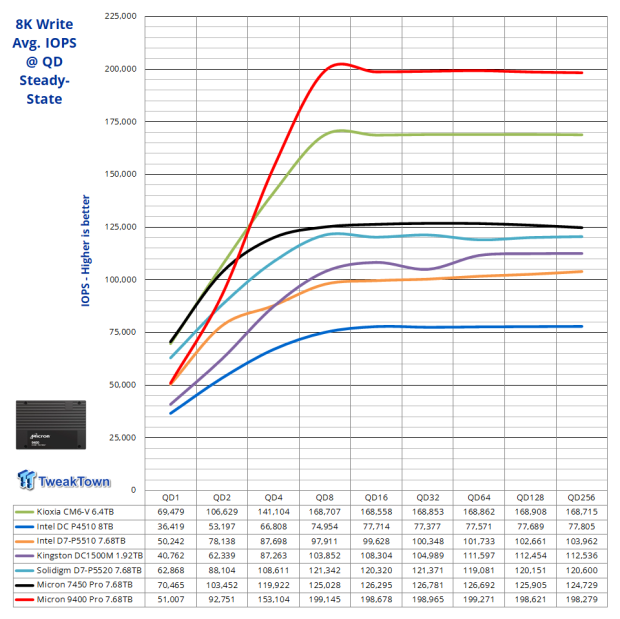
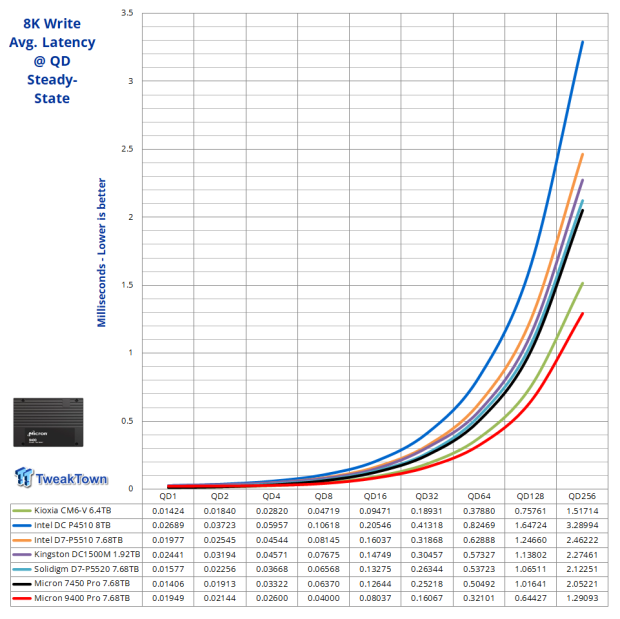
We expect 8K random to track exactly the same as 4K random, just at a lower rate. The 9400 Pro 7.68TB performs as expected, which is the best we've ever seen from a similarly overprovisioned flash-based SSD.
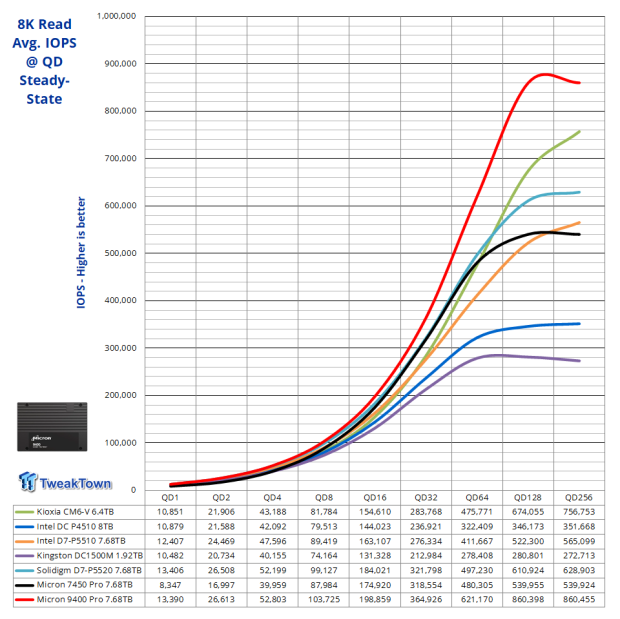
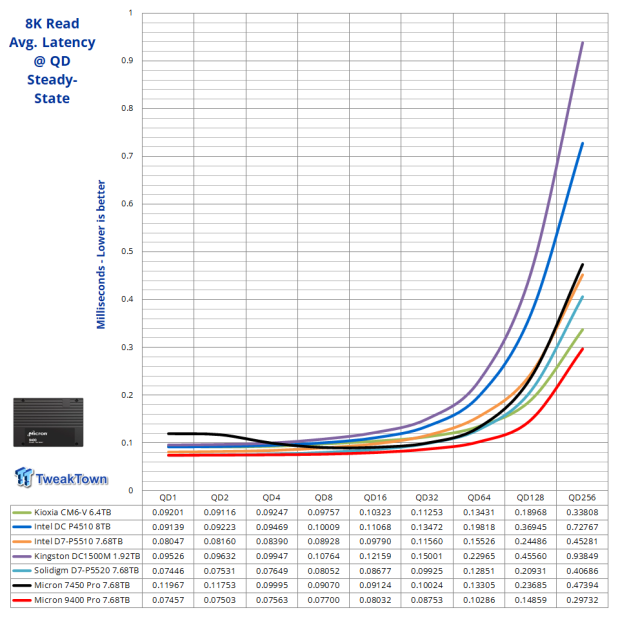
The 9400 Pro does what the 7450 Pro couldn't by delivering a performance curve superior to that of the D7-P5520. Impressive.
128K Sequential Write/Read
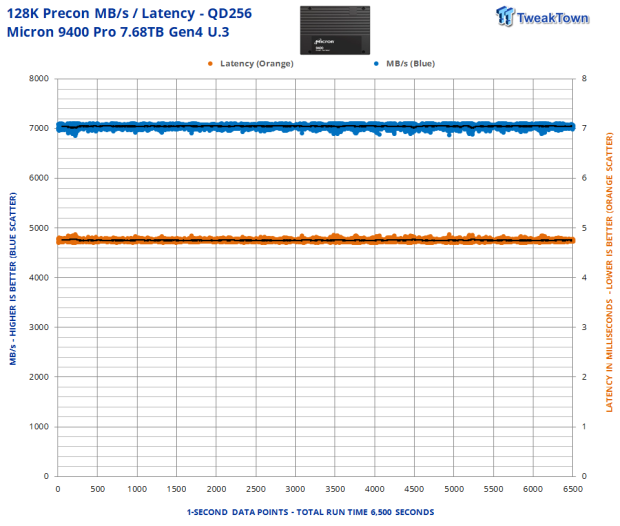
We precondition the drive for 6,500 seconds, receiving performance data every second. Steady-state for this test kicks in at 0 seconds. The average steady-state sequential write performance at QD256 is approximately 7,050 MB/s.
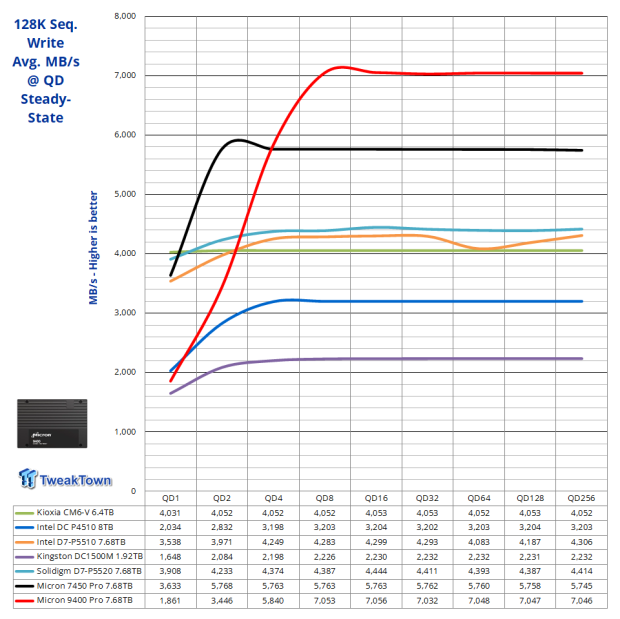
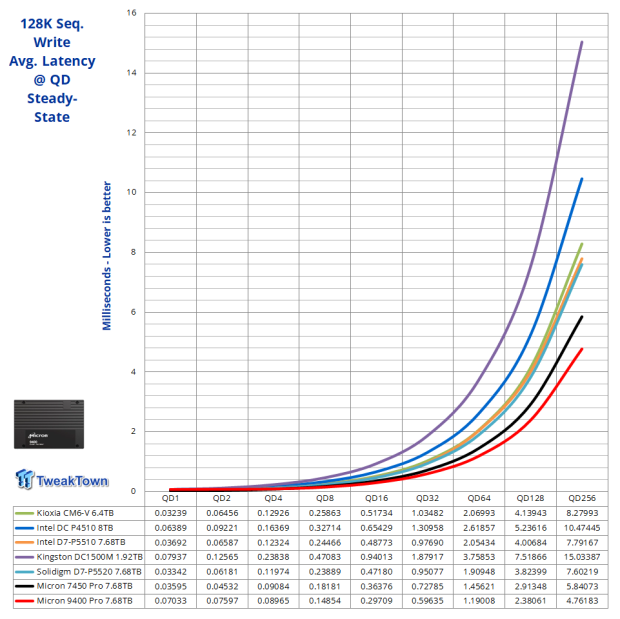
Unprecedented sequential programming throughput at queue depths of four or higher. For some perspective, that's 60% better than its main competitor, the D7-P5520.
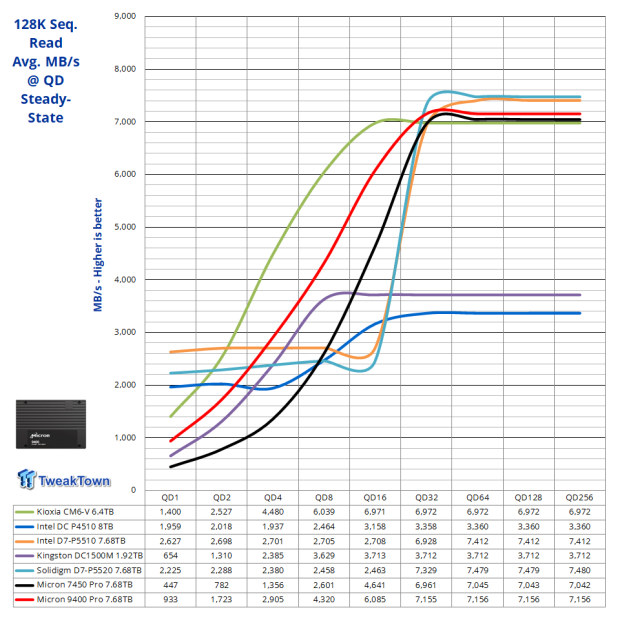
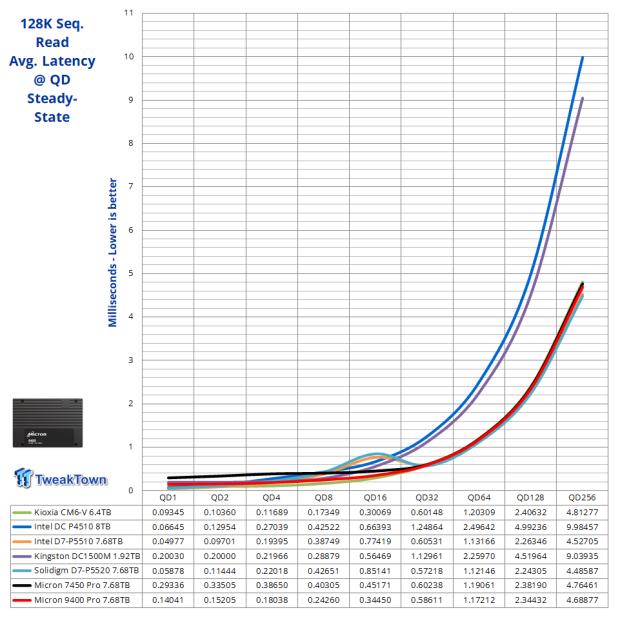
Better than advertised sequential throughput here and, more impressively, the second-best performance curve we've recorded for this test.
Benchmarks - Server Workloads
Email Server
An Email Server workload is a demanding 8K test with a 50 percent R/W distribution. This application gives a good indication of how well a drive will perform in a write-heavy workload environment.
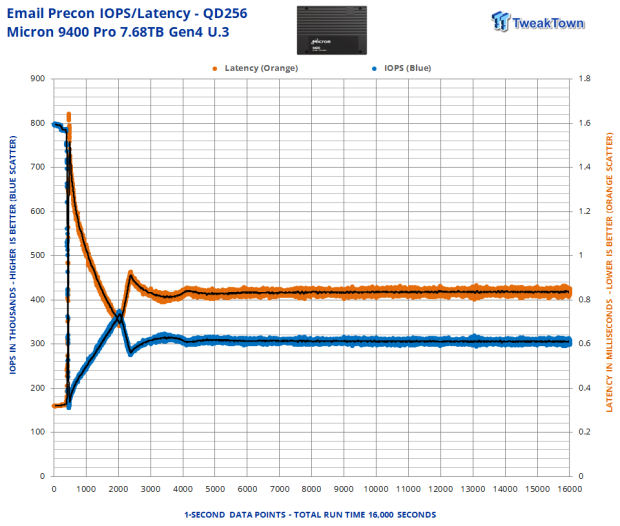
We precondition the drive for 16,000 seconds, receiving performance data every second. We plot this data to observe the test subject's descent into steady-state.
Steady-State is achieved at approximately 8,000 seconds of preconditioning. The average steady-state workload performance at QD256 is approximately 305K IOPS. Our data pattern indicates extremely good QoS, among the best we've seen for a flash-based SSD.
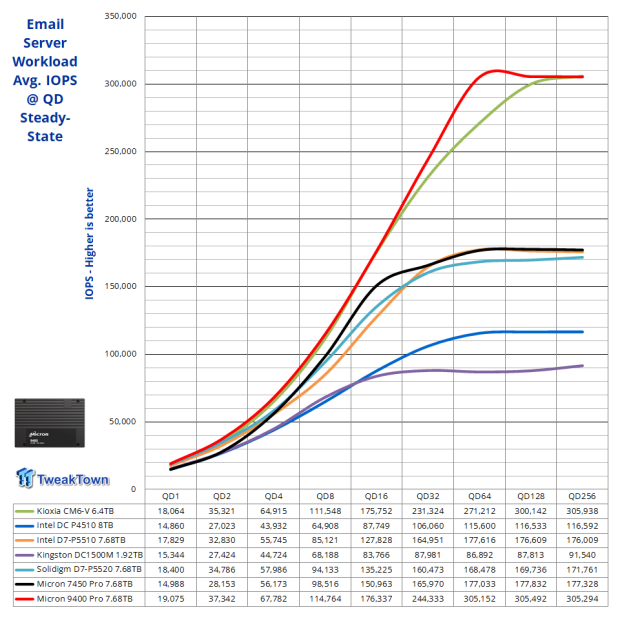
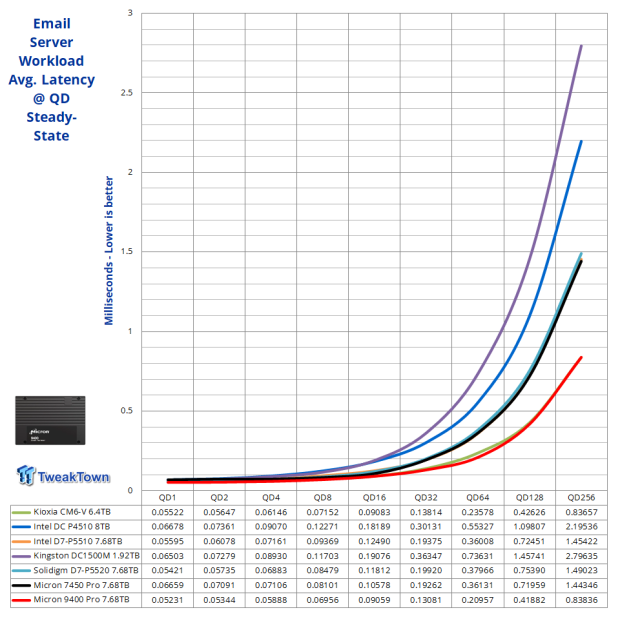
This is performance that matters. Workloads are where the rubber meets the road, and this is where we begin to see that Micron's claims of its 9400 series SSD being the best performing of its kind are well founded. This is incredible because we have a 1 DWPD SSD (9400 Pro) beating a 3 DWPD SSD (CM6-V) in a workload with a 50% R/W distribution.
OLTP/Database Server
An On-Line Transaction Processing (OLTP) / Database workload is a demanding 8K test with a 66/33 percent R/W distribution. OLTP is online processing of financial transactions and high-frequency trading.
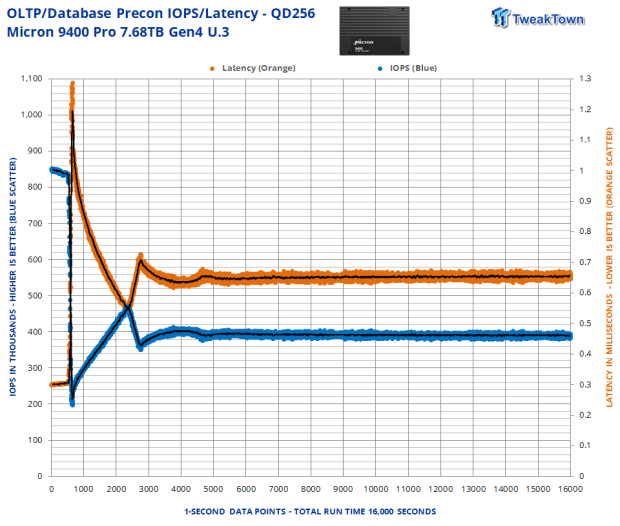
We precondition the drive for 16,000 seconds, receiving performance data every second. We plot this data to observe the test subject's descent into steady-state.
Steady-state is achieved at 6,000 seconds of preconditioning. The average steady-state workload performance at QD256 is roughly 390K IOPS. Again, the data pattern indicates exceptional QoS.
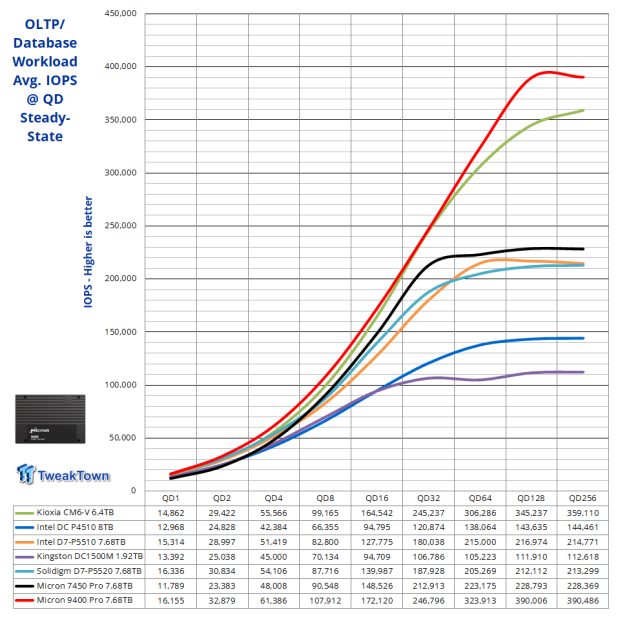
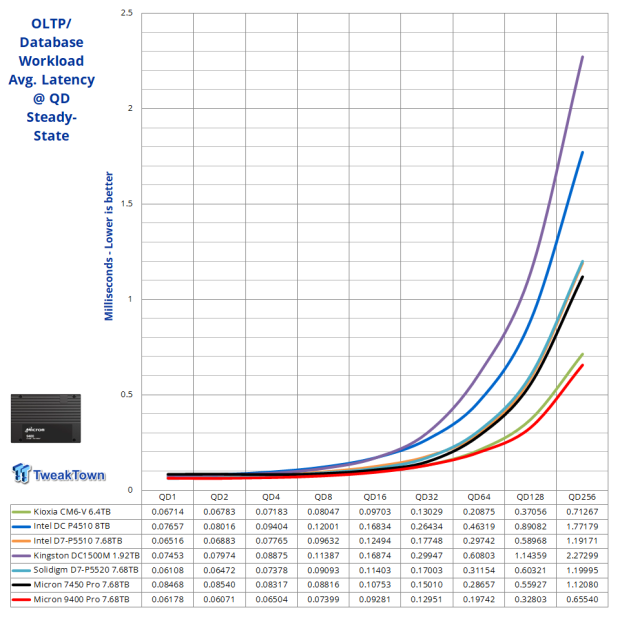
Another lab record for a flash-based SSD. Here again, we are getting unprecedented performance from our test subject in that a similarly interfaced 1 DWPD SSD is not expected to outperform a 3 DWPD SSD when writing data is a good chunk of the mix. Stunning really.
Web Server
A Web Server workload is a pure random read test with a wide range of file sizes, ranging from 512B to 512KB at varying percentage rates per file size.
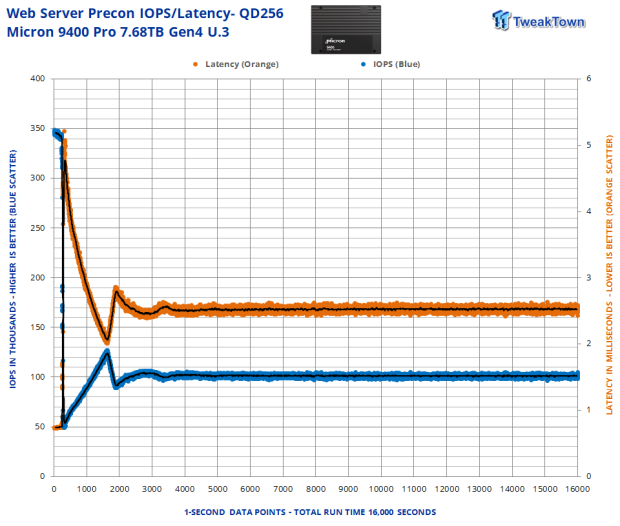
We precondition the drive for 16,000 seconds, receiving performance data every second. We plot this data to observe the test subject's descent into steady-state.
We precondition for this test with an inverted (all-write) workload, so no relevant information can be gleaned from this preconditioning.
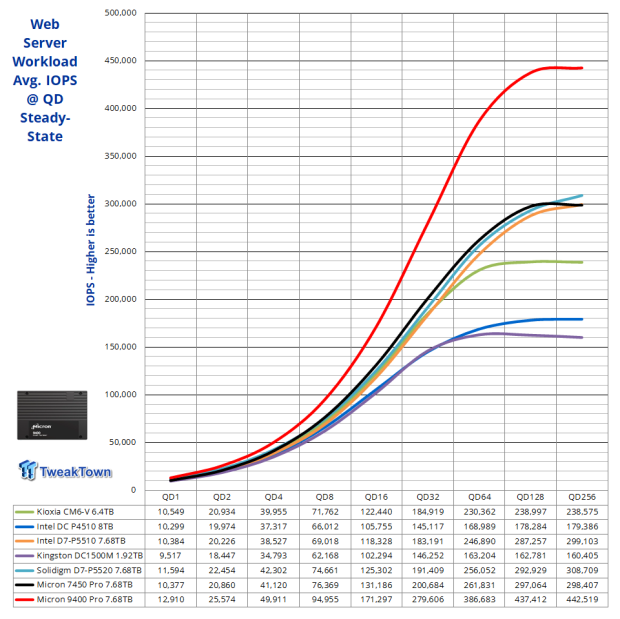
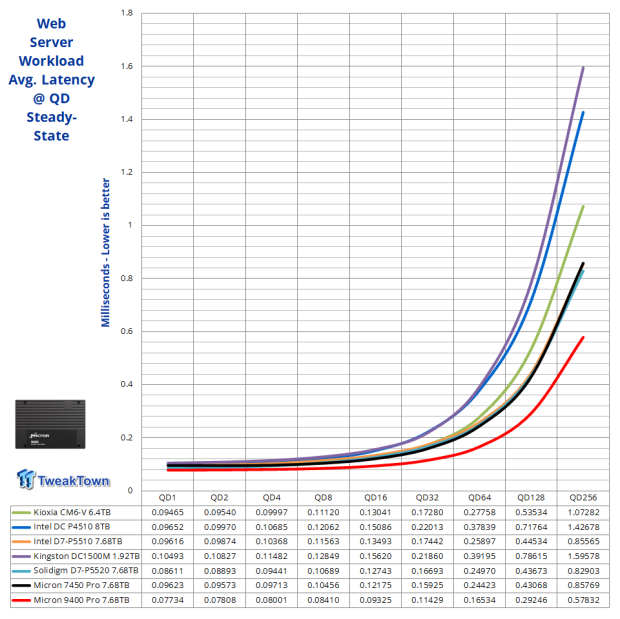
It could be said that this test, in particular, is the most demanding we run. For example, just look at what it does to the CM6-V. We were highly impressed by the 7450's performance here, as it produced the best results for a flash-based SSD we'd ever seen.
We assumed the 7450 demonstrated the peak of what B47R is capable of delivering. Wrong. Our test subject demonstrates that B47R can deliver far more than we imagined possible.
At a staggering 442K IOPS, our test subject is cranking out 43% more performance than anything in its class. This is real performance, performance that matters, and we would have to say the single most impressive result we've ever obtained from a flash-based SSD.
Final Thoughts
After testing its immediate predecessor, the 7450 Pro, we came to the realization that in an enterprise environment, B47R overall delivers better than anything we've come across to date. So, when we caught wind of the B47R arrayed Micron 9400, we knew it would be a superior performer, maybe a bit faster and or higher capacity than the 7450. What we didn't anticipate was the 9400 series taking B47R to a whole other level and doing so where gains are the hardest to come by.
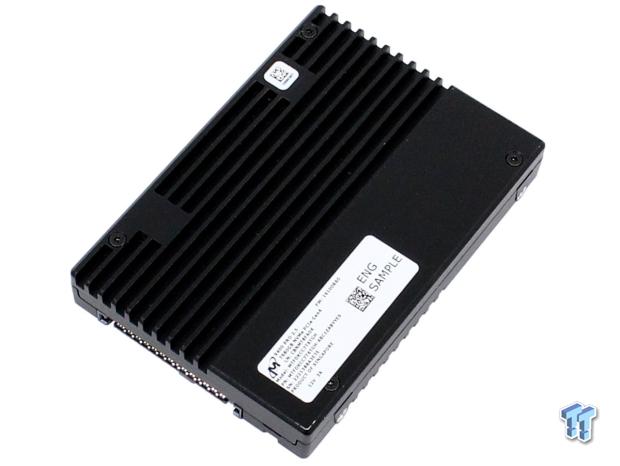
Micron's 9400 Pro is by far the best-performing flash-based SSD of its kind we've ever tested. Additionally, with capacities up to 30.72TB, it's easily the most efficient in terms of TCO, which is defined as footprint, IOPS per watt, and per device density.
A new level of performance. Editor's Choice.

